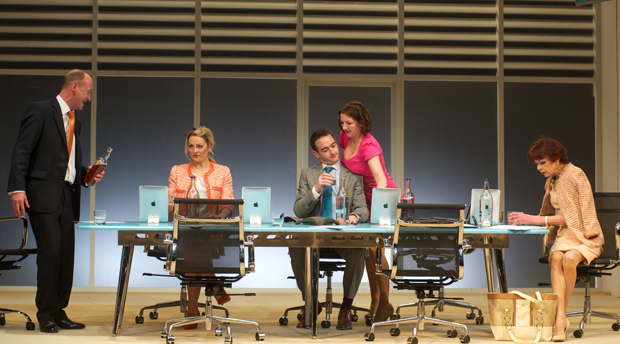Showing @ Royal Lyceum Theatre, Edinburgh until Sat 14 Apr
We’re always in need of impressive social satire, not just to highlight our current economic climate, but to enliven professional theatre which is at risk of settling into mediocrity in Scotland. Though Mark Thomson’s adaptation of Beaumarchais’s 1778 text wanders on the obvious side a little too much, it’s largely a carefully considered and admirably traditional reimagining.
It seems like we must always return to the classics for our deepest social criticism. Thomson and writer DC Jackson update Beaumarchais’s text for the 21st century as asset bankers Figaro and Suzanne (Mark Prendergast and Nicola Roy) are soon to be married following the high-profile merger of their company with another. In steps The Chief (Stuart Bowman) and P.A. Margery (Molly Innes) who try to split the lovebirds up before the lot of them are at it, each attempting to outfox the other.
DC Jackson’s script overcomes some clumsy, wordy pitfalls early on to become quite lyrical. Some gentle alliteration mixed in with Lorenzo Da Ponte’s libretto from Mozart’s opera buffa (the arias commandingly performed by Prendergast) ascribes a playful energy which keeps the text’s weight at arm’s length. With this friskiness comes a truly adept revision however as Thomson uses it to include all the little slapstick and farcical elements which Beaumarchais originally took from commedia dell’arte. The characters are stock, the gags blatant and the emotions melodramatic. Roy, Bowman and Innes are typically first-rate, Bowman in particular as the bullish yet overtly comical executive. Alex Lowde’s design works well with the operation as secondary characters frequently rush in and out of the surrounding office doors, though perhaps a little too often, and alleviate pressure on the script.
While it’s hard to miss the relevancy of such an adaptation (setting it among a horde of squabbling bankers is hardly the most subtle decision), Thomson just stops short of slapping us in the face with contemporary references. He makes it lewd enough so that sexual politics always remain the fundamental business catalyst; the characters might succeed in the office but can still fail in the bedroom. Even bankers are human. The text, the music and the storyline are already there to be enjoyed – it’s Thomson’s job to avoid stepping on the toes of Beaumarchais which he does with vigilance and respect. With this adaptation comes a droll glance into boardroom immaturity, something which facelessness in the corporate zone prevents us from seeing. It questions our potential unwillingness to alter political systems and aristocratic governance yet asks us to laugh at how ludicrous the world of management can be. The question is: will we hold it accountable?


One thought on “The Marriage of Figaro”